Elder Richard G. Scott: A Beloved Leader in Latin America
Contributed By Jason Swensen, Church News staff writer
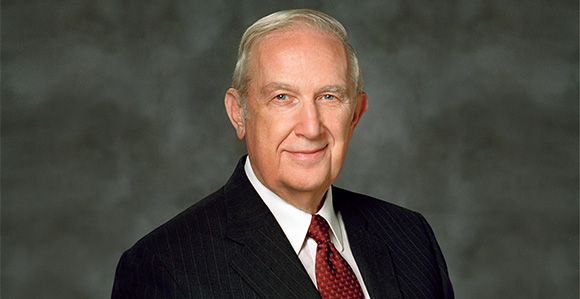
Spanish-speaking members across the globe are mourning the September 22 death of Elder Scott. Perhaps they loved him because they knew he loved them.
Article Highlights
- Spanish-speaking members across the globe are mourning the September 22 death of Elder Scott.
- His connection to Latin America and its people began when he accepted a mission call to Uruguay.
“I don’t go anywhere, especially in Latin America, where he served for so long and in so many places—I don’t go anywhere there that I don’t see his footprints, where I don’t meet somebody who hasn’t been influenced by him in some way.” —Elder D. Todd Christofferson of the Quorum of the Twelve Apostles
Several years ago, Jose Pacheco was working in the men’s section of a Salt Lake City-area department store when a customer approached him.
Brother Pacheco was still a teenager, but he immediately recognized the elderly man with kind eyes—Elder Richard G. Scott. The young sales associate helped the Apostle select a few white shirts. Then Elder Scott paid for his items, wished the young man well, and went on his way.
To many observers, that brief interaction between the two might have seemed routine and forgettable. But for a Latino Latter-day Saint such as Brother Pacheco, interacting for a few moments with Elder Scott was a lifelong, even faith-affirming memory.
He and other Spanish-speaking members across the globe are mourning the September 22 death of Elder Scott. Perhaps they loved him because they knew he loved them. He relished any opportunity to be among them.
Elder Scott’s well-established connection to Latin America and its people began more than a half-century ago when he accepted a mission call to Uruguay. While serving as a young man in South America, he learned to speak Spanish. That second language would serve him well for the rest of his life.
Spanish speakers often say, with a wink, that their language “is the language of God.” Elder Scott may have agreed.
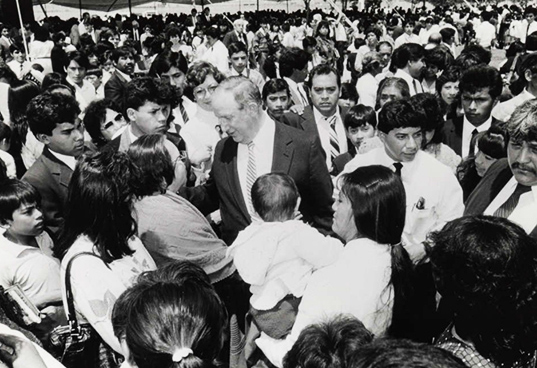
Elder Richard G. Scott greets members at a conference in Chalco, Mexico, as the Tecalco Mexico Stake is created, the 100th stake in this nation, on June 25, 1989. Photo courtesy of Deseret News Archives.
Many Spanish speakers say their testimonies were strengthened whenever they listened to the Idaho native share his witness of Christ in their own language. For many years, Elder Scott prerecorded a Spanish and a Portuguese version of his general conference talks so millions of members in the Church could hear his words of counsel delivered in his own voice.
Elder Scott knew well the opportunities afforded in learning a second language. At a 2002 Christmas devotional held in the Conference Center for Spanish-speaking members, he encouraged his audience to learn English. Someone who speaks both Spanish and English, he said, can enjoy economic, social, and spiritual benefits. Even older men and women can learn a new language if they are patient and willing to make a few mistakes.
“It’s going to take time and effort,” he encouraged, “but you can do it.”
Elder Scott’s family said his full-time mission to Uruguay forged an unshakable testimony. That witness was only fortified after his calling in 1965 to preside over the Argentina North Mission.
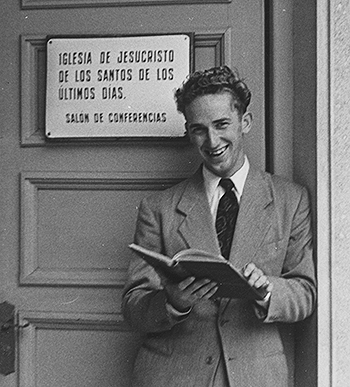
As a young man, Richard G. Scott served a mission to Uruguay, where he learned to speak Spanish.
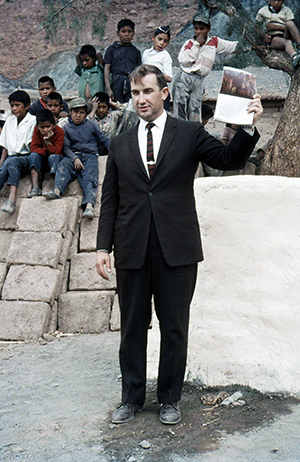
President Richard G. Scott holds a Book of Mormon in Bolivia.
Elder D. Todd Christofferson of the Quorum of the Twelve Apostles was one of President Scott’s young missionaries. Young Elder Christofferson worked with his mission president for a time at the mission office in Cordoba.
Last May, Elder Christofferson returned to his mission headquarters to participate in the dedication of the Cordoba Argentina Temple. [See related story.] Elder Scott was not well and could not attend the dedication. But Elder Christofferson said his former mission president and fellow Apostle was frequently in his thoughts.
“I don’t go anywhere, especially in Latin America, where he served for so long and in so many places—I don’t go anywhere there that I don’t see his footprints, where I don’t meet somebody who hasn’t been influenced by him in some way,” he added in a Church statement.
President Dieter F. Uchtdorf, Second Counselor in the First Presidency, presided at the Cordoba Temple dedication. The spirit at the event, he said, “could not have been better—it felt like Elder Scott was here.”
Not long after becoming a General Authority in 1977, Elder Scott once again called Latin America home. He and his family lived in Mexico City while he served as Executive Administrator in Mexico and Central America.
Once again, he made lifelong friends and inspired and uplifted thousands in that region of the Church.
The Latter-day Saints in Latin America “have a desire to serve the Lord and obey His commandments,” he once said. “It’s very easy for anyone who works with them to have deep love and high regard for them.”
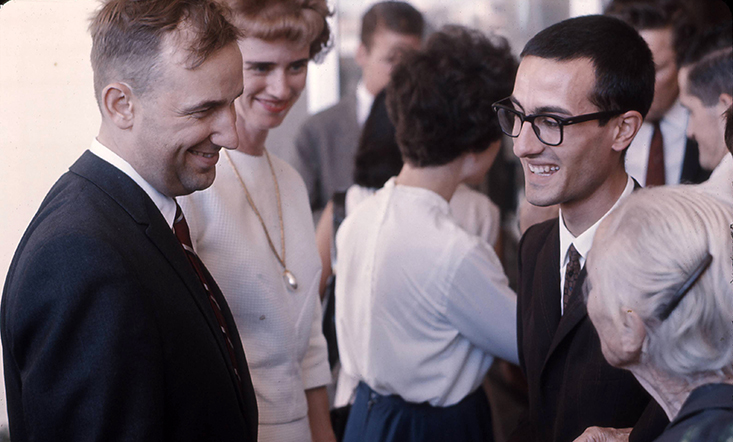
President Richard G. Scott and his wife, Jeanene, greet members in Argentina, where he served as president of the Cordoba Argentina Mission.
